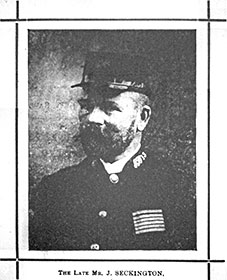|
|||
|
Rushden Echo, January 25th 1924, transcribed by Kay Collins
|
|||
|
Death of Mr Jonathan Seckington
|
|||
|
Rushden Tradesman Passes Away |
|||
|
When Mr. Seckington first started postal work the late John Groome was postmaster at Higham Ferrers and the late Mr. C Hewitt at Rushden. Higham Ferrers was then a head office, Rushden being subordinate to it, whereas both Higham and Rushden are now sub-offices to Wellingborough. In the Early Eighties Rushden began to grow by leaps and bounds. Practically the only boot manufacturers at Rushden in 1873 were Mr. John Cave, Messrs. B. Denton and Son, Mr. William Claridge, and Mr. William Colson, and the only bit of pavement was in High-street, opposite Mr. Denton’s factory and shops, there being some old stone flags at that spot. Mr. Seckington used to leave Higham at 6.a.m. and, after delivering the letters in Rushden, had to go to Wymington, getting there about 9a.m. Her returned at ten o’clock, and then had the same journey to do at mid-day. Rushden kept growing, and then he had to be relived of one of the Wymington journeys; afterwards the other Wymington journey was taken away, and he had to devote all his time to Rushden. Still Rushden grew, and then he had a man to help him, afterwards two, then three, after that four, and eventually six. Today there are not more than two or three residents in Rushden living in the same houses as when Mr. Seckington commenced his duties 50 years ago, and there was then no railway. The old thatched houses in Rushden used to be very low, and hundreds of times Mr. Seckington handed people their letters through the bedroom windows, which he could easily reach. When delivering in Duck-street (then usually called Duke-street) he had many a time to wade through the water, as people used to throw all sorts of things into the brook, so that the water could not run away. To Mr. Seckington fell the duty of delivering the first parcel which Rushden by parcel post from abroad. It was forwarded by his own brother, who was in India at the time, and it was addresses to Mr. Seckington himself, so that he had to deliver to himself. The parcel contained a collection of curios from India. In June 1907, at the age of 58, Mr. Seckington, through failing health, retired from the postal service, and was placed on the superannuation fund, being the first established postman of Rushden to retire on a pension. He was at that time anxious to serve two more years, if he had been able, and then he would have reached the age limit of 60, when he could have claimed the full pension, but unfortunately he was medically disqualified. On the occasion of his resignation he was presented by the postal staff with a handsome silver teapot, Mr. Field (the postmaster) saying Mr. Seckington had set an example of strict attention to duty and had gained their respect and esteem by his unvarying geniality. Mr. J. T. Lovell, who succeeded Mr. Seckington as senior postman also added his tribute to Mr. Seckington’s work and worth. Mr. Seckington left the service with six good conduct stripes—the highest number possible. In 1878 Mr. Seckington, while still in the postal service, started the business of seedsman and florist, and eventually he was joined by his son, Mr. H. M. Seckington, and the business is well known all over the district. Mr. Seckington was the oldest director of the Rushden Conservative Club, and the flag at the club was flown half-mast high on receipt of the news of his death. He was one of the earliest members of the Free Gardeners’ Friendly Society. As long as his health permitted he was a regular attendant at St. Mary’s Church, and he always used to occupy a seat in the Memorial Chapel. Mr. Seckington’s health had failed very much of late, and for the last couple of months he had been confined to his bed. He will be greatly missed by the older generations of Rushden residents, and will be remembered by them as a man of sterling worth of character. The funeral took place on Tuesday afternoon, and impressive service being held in St. Mary’s Church. |
|||
 Rushden has lost a valued public servant and a much-loved townsman in the death of Mr. Jonathan Seckington, founder of the firm of Messrs. J Seckington and Son,
Rushden has lost a valued public servant and a much-loved townsman in the death of Mr. Jonathan Seckington, founder of the firm of Messrs. J Seckington and Son,